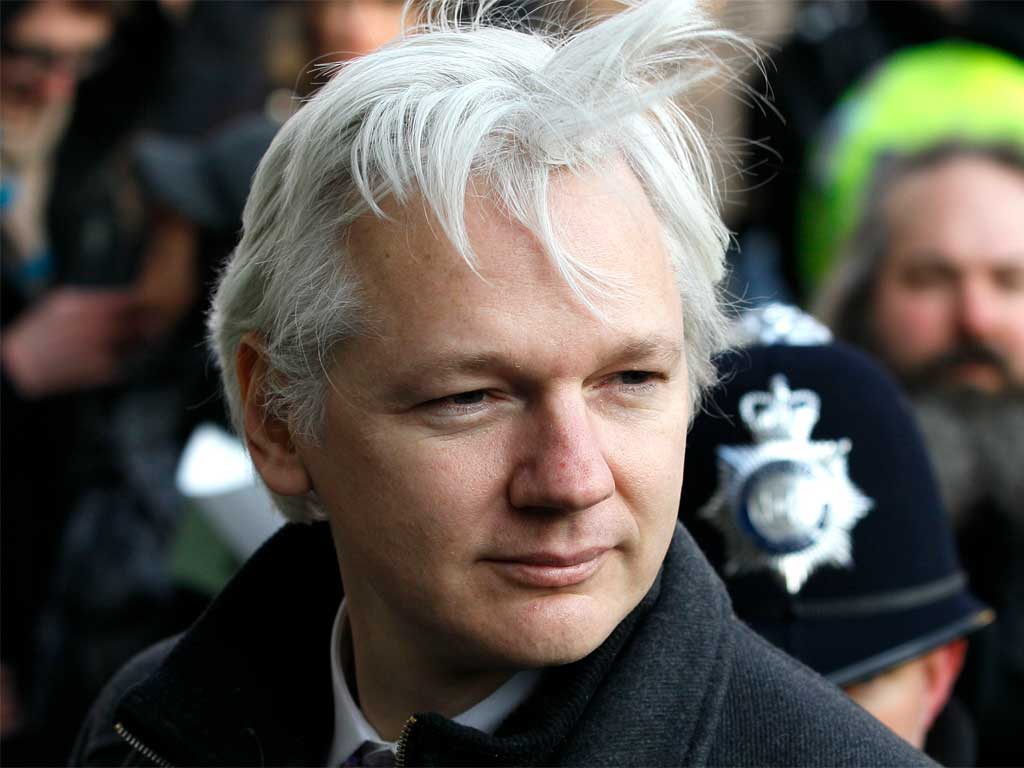Julian Assange seeks asylum in Ecuador embassy
WikiLeaks founder takes refuge in London embassy in bid to avoid extradition to Sweden

Your support helps us to tell the story
From reproductive rights to climate change to Big Tech, The Independent is on the ground when the story is developing. Whether it's investigating the financials of Elon Musk's pro-Trump PAC or producing our latest documentary, 'The A Word', which shines a light on the American women fighting for reproductive rights, we know how important it is to parse out the facts from the messaging.
At such a critical moment in US history, we need reporters on the ground. Your donation allows us to keep sending journalists to speak to both sides of the story.
The Independent is trusted by Americans across the entire political spectrum. And unlike many other quality news outlets, we choose not to lock Americans out of our reporting and analysis with paywalls. We believe quality journalism should be available to everyone, paid for by those who can afford it.
Your support makes all the difference.Julian Assange, the founder of WikiLeaks, sought political asylum at Ecuador's embassy in London yesterday in a dramatic attempt to avoid extradition to Sweden.
Mr Assange, who is wanted by authorities in Stockholm to answer to allegations of sex crimes, walked into the embassy in Knightsbridge yesterday afternoon and requested asylum under the United Nations Human Rights Declaration. A statement issued on behalf of the embassy said that Mr Assange would remain at the embassy under the protection of the Ecuadorian government while it considers his application.
"As a signatory to the United Nations Universal Declaration for Human Rights, with an obligation to review all applications for asylum, we have immediately passed his application on to the relevant department in Quito," the statement said.
Ecuador's Foreign Minister, Ricardo Patino, said the Australian had taken refuge at its embassy and that the country's government was weighing up the request. Mr Patino, speaking at a press conference in Ecuador, said Mr Assange had written to the Ecuadorean President Rafael Correa, saying he was being persecuted and seeking asylum.
Mr Patino said the Australian had written that he could not return to his home country because it would not block his extradition to "a foreign country that applies the death penalty for the crime of espionage and sedition".
The move follows a long-running legal bid by Mr Assange, 40, to halt his extradition to Sweden, where he is accused of raping a woman and sexually molesting and coercing another in Stockholm in August 2010.
The UK Supreme Court decided on 30 May that extradition was lawful and could go ahead, and last week it refused an attempt by him to reopen his appeal against extradition, saying it was "without merit".
Mr Assange, whose WikiLeaks website has published a mass of leaked diplomatic cables that embarrassed several governments and international businesses, said the sex was consensual and the allegations are politically motivated.
After his arrest in December 2010, Mr Assange had a number of famous friends and supporters who helped him to raise bail of £240,000. Last night, the socialite and charity fundraiser Jemima Khan, who is thought to have donated a significant amount towards that sum, said on Twitter: "I had expected him to face the allegations. I am as surprised as anyone by this."
In a short statement issued yesterday evening, Mr Assange said: "I can confirm that today I arrived at the Ecuadorian embassy and sought diplomatic sanctuary and political asylum. I am grateful to the Ecuadorian ambassador."
Join our commenting forum
Join thought-provoking conversations, follow other Independent readers and see their replies
Comments